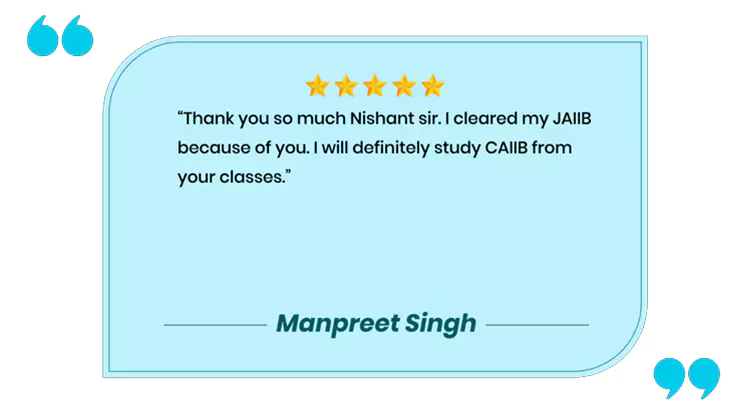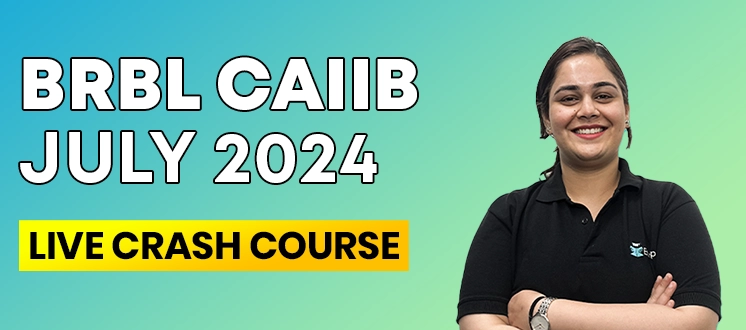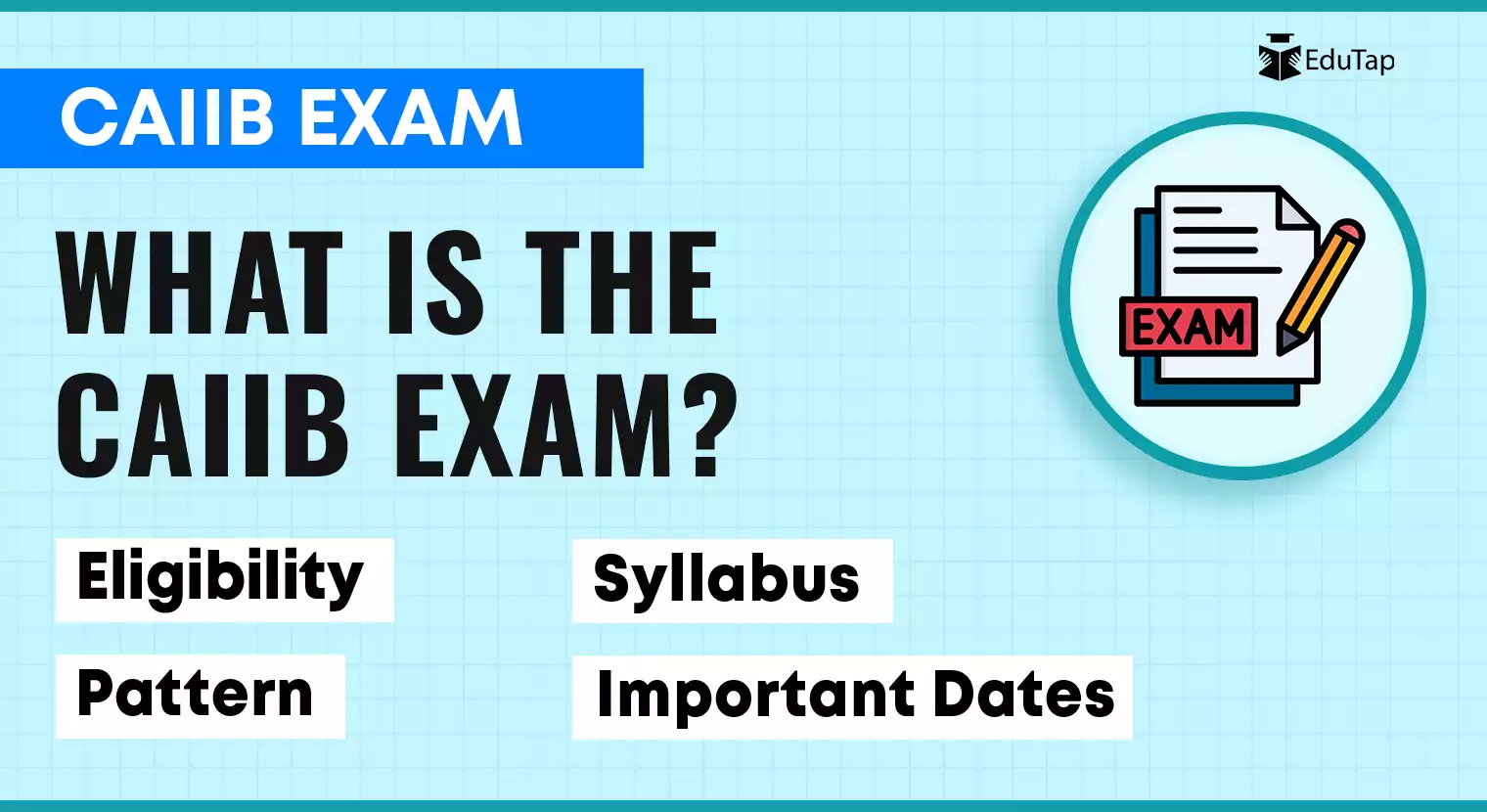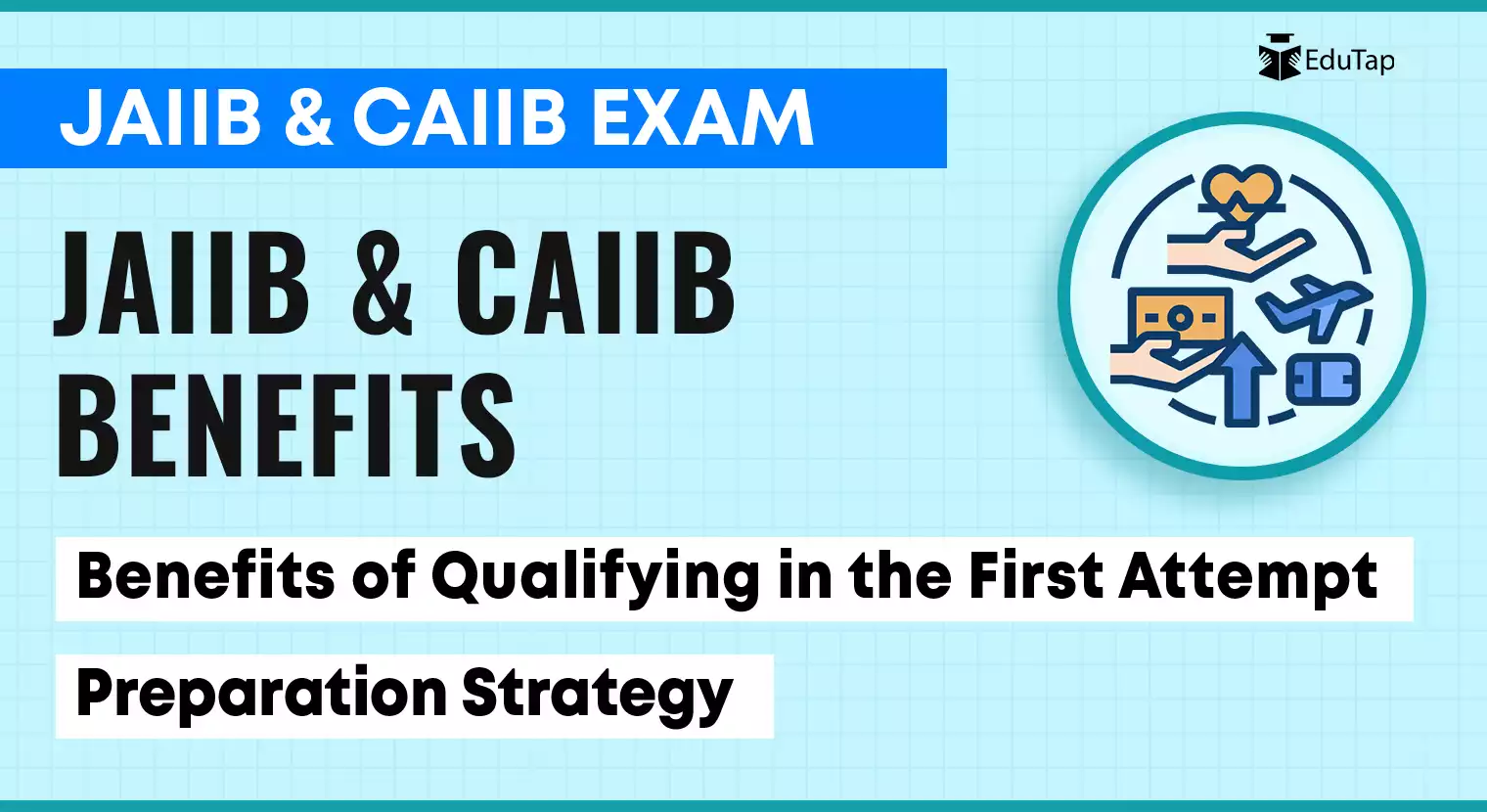To be eligible for the CAIIB examination, you need to:
- Clear the JAIIB (or PART 1 of the Associate Examination).
- Members Only: Be employed with a bank/financial institution.
Looking at it this way, clearing JAIIB is a lot like matriculation/secondary studies and CAIIB is the graduation. For admission to a graduation degree, you need to clear your 12th studies.
NOTE: The Reserve Bank of India, State Bank of India, other financial institutions, both central and state-owned, cooperative banks, and any other institutions that the IIBF Council accepts make up the membership of the organization.
Here’s a detailed overview of the CAIIB exam pattern:
| Papers | No. of Questions | Total Marks |
Time Duration |
| Paper 1: Advanced Bank Management | 100 | 100 | 2 hours |
| Paper 2: Bank Financial Management | 100 | 100 | 2 hours |
| Paper 3: Advanced Business & Financial Management | 100 | 100 | 2 hours |
| Paper 4: Banking Regulations and Business Laws | 100 | 100 | 2 hours |
| Paper 5: Elective Paper
(Candidates to choose any one of their Choice)
|
100 | 100 | 2 hours |
CAIIB Exam Pattern: Additional Details
The CAIIB Exam is held online, and the type of questions are multiple-choice. Each paper carries 100 marks, and there is no negative marking for wrong answers. Each paper is held on different dates, and the duration for each paper is 2 hours. The cut-off for each paper is 50%, i.e. 50 marks out of 100.
For your easy understanding, we have provided the above-mentioned information in a table form below.
| Additional Details of the CAIIB Exam Pattern | |
| Total Papers | 4 (Compulsory) + 1 (Elective) |
| Total Questions | 100 per paper |
| Total Marks | 100 per paper |
| Total Duration | 2 Hours (120 Minutes) per paper |
| Negative Marking | No |
| Medium of Exam | Hindi or English |
| Mode of Exam | Online |
| Nature of Questions | Objective Multiple Choice Questions (MCQs)
(or) Numerical Questions where candidates have to type the answer |
| Pattern of Questions |
|
Following is an overview of the various modules for the compulsory and elective papers.
Compulsory Papers Syllabus
| Papers | Modules | Syllabus |
| Paper 1: Advanced Book Management | Module A | Statistics |
| Module B | Human Resource Management | |
| Module C | Credit Management | |
| Module D | Compliance in Banks & Corporate Governance | |
| Paper 2: Bank Financial Management | Module A | International Banking |
| Module B | Risk Management | |
| Module C | Treasury Management | |
| Module D | Balance Sheet Management | |
| Paper 3: Advanced Business & Financial Management | Module A | The Management Process |
| Module B | Advanced Concepts of Financial Management | |
| Module C | Valuations, Mergers, & Acquisitions | |
| Module D | Emerging Business Solutions | |
| Paper 4: Banking Regulations and Business Laws | Module A | Regulations and Compliance |
| Module B | Important Acts/Laws & Legal Aspects of Banking Operations(Part A) | |
| Module C | Important Acts/Laws & Legal Aspects of Banking Operations(Part B) | |
| Module D | Commercial & Other Laws with Reference to Banking Operations |
Elective Papers Syllabus
| Papers | Modules | Syllabus |
| Paper 1: Rural Banking | Module A | Rural India |
| Module B | Financing Rural Development | |
| Module C | Priority Sector Financing & Govt. Initiatives | |
| Module D | Problems & Prospects in Rural Banking | |
| Paper 2: Human Resources Management | Module A | Human Resource Management |
| Module B | Building an HR Strategy | |
| Module C | Motivation, Training, and Skill Development | |
| Module D | Personnel Management and Industrial Relations | |
| Module E | Emerging Scenario in HRM | |
| Paper 3: Information Technology & Digital Banking | Module A | Information Technology & Digital Banking |
| Module B | Systems & Design | |
| Module C | Banking Technology Applications & Digital Banking | |
| Module D | Information System Security Controls & Audit | |
| Paper 4: Risk Management | Module A | Risk & Risk Management Framework |
| Module B | Credit Risk | |
| Module C | Market Risk | |
| Module D | Operational Risk | |
| Module E | Basel & RBI Guidelines on Risk Management | |
| Module F | Derivatives & Risk Management | |
| Paper 5: Central Banking | Module A | Rationale & Functions of Central Bank |
| Module B | Central Banking in India | |
| Module C | Monetary & Credit Policies | |
| Module D | Management of Foreign Exchange Reserves & Constituents of Indian Financial Market | |
| Module E | Regulation, Supervision, and Financial Stability | |
| Module F | Non-Banking Financial Companies & Primary Dealers |
Applicants can either choose an elective in the area they are currently employed in or in the area they would like to work in the future. The best method to select your elective is to pick the area you are currently working in and later move to another elective. This helps you advance your expertise and explore new areas.
To pass with flying colors, you need a minimum of 50 out of 100 in each subject. But, if you score at least 45 in each subject and 50% overall in 1 attempt, you’re still in the game. Here is a detailed explanation.
- You must receive a minimum of 50 out of 100 marks in each Paper.
- However, you will be considered to have passed the exam if you receive at least 45 marks in each topic and an overall score of 50% in all subjects in a single try. Applicable only when all papers are cleared at once.
- Until the time frame allocated for completing the examination expires, which is 3 years, you are permitted to keep credits for the subjects you have attempted and passed.
The CAIIB exam is qualifying in nature. To pass, candidates must score a minimum of 50 out of 100 marks in each subject. Candidates must secure at least 45 marks in each subject with an aggregate of 50% marks in all subjects of the examination in a single attempt to clear the exam. However, achieving the target of scoring 50 marks in each subject is not a simple task. It requires a practical preparation strategy, a disciplined approach, and effective time management.
Here’s a step-by-step guide to help you prepare effectively:
Step 1: Make Up Your Mind
The initial step for the CAIIB Exam begins with making up your mind. Having already succeeded in the JAIIB exam, with dedicated effort, cracking CAIIB is well within reach.
Make sure you don’t make any excuses, as making excuses will hinder your progress, resulting in both financial and confidence setbacks. Moreover, don’t be content with your current position. Always motivate yourself (be it monetary benefits, promotion, etc.) and make up a firm mind to clear the exam.
Step 2: Understand the CAIIB Exam Pattern and Syllabus
Familiarize yourself with the exam pattern, marking scheme, and syllabus. Understand the number of papers, subjects, modules of each subject, and important topics. Choose the Elective Paper according to your strengths.
Step 3: Identify Sources
After understanding your subjects, it’s time to identify your sources for preparation. The market is filled with a variety of sources, both online and offline, creating confusion about which source to consider. Avoid confusion by clearly defining which source to utilize for each specific subject or topic.
Step 4: Self-Study or Coaching
To identify whether you can do self-study or need coaching, you need to ask yourself these questions.
- Do you have basic knowledge of each subject?
- Can you analyze the previous years’ papers on your own?
- Can you understand topics from books and other free materials on your own?
- Can you ensure self-discipline?
If you can do all of the above-mentioned points, you can clear the exam using free materials and self-study. However, if you cannot, coaching will help you prepare for the CAIIB exam.
Having said this, always remember that coaching serves 4 important purposes:
- The expert faculty does the hard part of analyzing the previous years’ questions.
- You get everything you need to clear the exam in one place, and this saves you time.
- You get doubts support, so whenever you have any doubt related to any subject, you know there is a mentor you can contact.
- You get a community of like-minded people sailing in the same boat as yours, giving a feeling of belongingness.
This is an overall strategy for your CAIIB preparation.
Blog
SELECT YOUR ONLINE MENTORSHIP COURSE
Strengthen your exam preparation with true MENTORSHIP and choose the course as per your learning needs.
OUR SUPER MENTORS
Meet our extraordinary teachers who are synonymous with expertise in their subjects. They are highly acclaimed for adding immense value to students’ preparation. Our students owe their success to them!

- B.Tech (ECE)
- The Ultimate ‘AFM Guru’
- Guided Aspiring Learners

- M.Com
- Cleared JRF-UGC Net
- Guided Aspiring Learners

- B.Tech (Mech)
- First Builds Fundamentals
- Guided Aspiring Learners

- M.Tech
- The ‘Ultimate Guru’
- Guided Aspiring Learners
STUDENT TESTIMONIALS
Listen to our students share their learning experiences as part of the EduTap family!

“Thank you so much Nishant sir. I cleared my JAIIB because of you. I will definitely study CAIIB from your classes.”

“Thank you Surender Sir. I am happy to tell you that I got 55 marks today in IE & IFS. All the credit goes to your extraordinary classes. Thank you very much, Sir.”
FREE RESOURCES LIBRARY
Dive deep into our free knowledge library and access Video Lectures, Previous Year Questions, Mock Tests, E-Books, Current Affairs, and more.
Memory-based year-wise compiled previous year question papers of all exams.
Weekly current affairs compilations important covering newspapers and websites.
Online lectures by our expert faculty to build a strong foundation of subjects.
Downloadable PDFs covering important topics in a crisp and easy to digest format.
Chapter-wise, sectional and full-length tests to assess your actual preparation level.
RECOMMENDED ARTICLES
Stay up-to-date with the latest articles written after thorough research of the CAIIB exam and excel in your exam preparation.
Frequently Asked Questions (FAQs)
The CAIIB 2024 registrations for the May cycle started on 07 May 2024. The first exam of Advanced Book Management is on 07 July 2024.
Employees of banks and financial institutions, whether they are officers, clerks, or other personnel in the banking sector, who have cleared the JAIIB exam, can apply for this exam.
The difficulty of cracking the CAIIB exam varies based on an individual’s preparation, background, and study approach. The exam demands dedication and a comprehensive understanding of the topics. Your success depends on consistent effort, effective time management, and a structured study plan.
While not mandatory, the CAIIB certification is highly beneficial and often preferred by banking professionals. Moreover, it enhances knowledge, skills, and career prospects in the banking sector.
Time management is crucial during the CAIIB exam. Allocate a specific time to each question and section, and move on if you get stuck on a particular question to ensure you complete the exam within the given time.
On average, dedicating 2 hours daily for 1.5 months per subject is a good preparation strategy for CAIIB. However, keep in mind that this is a general estimate and can vary based on individual strengths and weaknesses.
While CAIIB books are a good source for your preparation for the CAIIB exam, relying solely on them might not be the most effective strategy. Here’s a detailed explanation of why:
Although CAIIB books provide in-depth knowledge and cover the syllabus comprehensively, these books are bulky and use complex language. This can make it challenging for aspirants to understand and cover these books in a limited time.
Moreover, supplementing your preparation with multiple sources offers diverse perspectives and approaches to topics. Different study materials explain concepts differently, helping you grasp complex topics from multiple angles.
EXPLORE OTHER EXAMS
Discover more about other exams of IIBF









